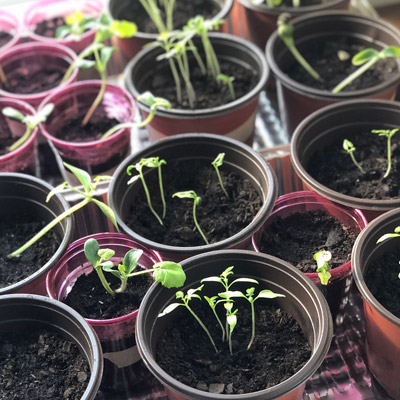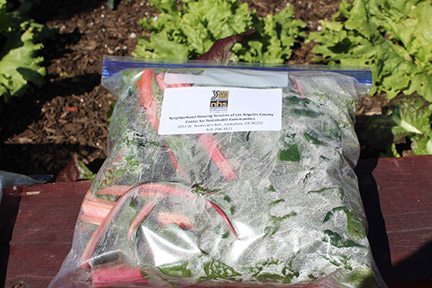During world wars, they were called "victory gardens," planted by families to help keep food on the table – and prevent food shortages. With grocery store shelves empty and families told to shelter in place during the COVID-19 pandemic, many people are returning to gardening and to the name.
"Everyone now is saying, 'I think I'm just going to grow my own food,' and there's a history behind that, with victory gardens," says Carrie Davis, president and CEO of Wealth Watchers Inc., a Florida NeighborWorks network organization. In urban areas, with space limitations and possible ground contamination issues, it can be harder to stake out a spot. But there are ways to do it – in planters or in raised beds. Davis says that across the country, people have begun experimenting.
"There are definitely low-cost options out there," Davis says. "And there is interest out there. People want to know where their food is coming from." And they want to avoid grocery stores, she says. Add to that: "You're homebound and there's nothing else you can do. Getting out there and digging in the dirt can be so therapeutic."
 Davis says she's seen people gardening like never before. She's also seen reports that seed companies are running low on seeds. In their wake, she says, neighbors are sharing seeds and plant cuttings. "There's a huge generosity among people," she says.
Davis says she's seen people gardening like never before. She's also seen reports that seed companies are running low on seeds. In their wake, she says, neighbors are sharing seeds and plant cuttings. "There's a huge generosity among people," she says.
To help educate, she's working with chef and farmer Matthew Raiford of Brunswick, Georgia, to create online workshops focused on sustainable agriculture. Raiford and his sister Althea are sixth-generation black farmers.
"We're going to show people how to compost at home, especially since so many people are home right now," Raiford says. "Another will be showing folks different ways to do container gardening. Not everybody has a lot of space." But a five-gallon pickle bucket, obtainable for a few dollars from a local sub shop can offer gardening options, he says. A third program will talk about how to keep your family safe when it comes to food.
The programs, still in the planning stages, will begin as webinars. "Hopefully, when all of this is done, we can do some programs in place."
Meanwhile, Davis is answering questions as she gets them, such as "What do we do about the deer?" (Plant seeds in the woods, like alfalfa, to keep deer from searching closer to your home for foods, she suggests, and plant things with rough textures or strong scents.)
Another question she answered recently pertained to SNAP benefits, and she wants people to be aware that you can use those to buy garden plants and seeds. It's a way to help grow your ability to feed your family, she says.
Compton, California
It was harvest time for the 22 raised beds that constitute the community garden in Compton, California. Sheila Moweta, food justice coordinator for Neighborhood Housing Services (NHS) of Los Angeles County's Center for Sustaining Communities, had hoped to have seniors from a nearby center help bring in the cauliflower, kale, collards, Swiss chard, snap peas, cilantro and purple mustard greens."They were looking for something to do," she says.
But by the time the crops were ready, the seniors had been given a mandate to stay inside. "We packed up everything – snap peas and collard greens that were so fresh, they didn't taste anything like in the store," Moweta says. They brought the crops to the center so the seniors could cook the bounty in their apartments.
Moweta also cooked the purple mustard greens and collards for residents to try. "Eating out of your own garden does change people. Now they see what they're looking at every day is delicious." The garden is part of a 20-year effort to ensure families who live in food deserts are eating more healthy foods.
Moweta isn't a master gardener. But she learned from her parents and her grandmother. And when she started as food justice coordinator, she began working with the students who had been watering the garden as part of a project with Metro Community Development Corporation and with the seniors who had come to weed it. What she didn't know, the community helped fill in, answering her questions about soil and pests. In the past year, they've turned it over twice, she says. "There's still a lot of rich soil in Compton," which is about 15 miles from Los Angeles, she says. And there's a lot of gardening.
 NHS also gave the seniors peat cups and beefsteak tomato seeds. "They can put them in their rooms in the window," Moweta says. "By the time [the COVID-19 danger] is over, we can collect them and put them in the garden. I'm doing it at home, too. Right now, tiny tomato leaves are coming up. But they're fragile, still."
NHS also gave the seniors peat cups and beefsteak tomato seeds. "They can put them in their rooms in the window," Moweta says. "By the time [the COVID-19 danger] is over, we can collect them and put them in the garden. I'm doing it at home, too. Right now, tiny tomato leaves are coming up. But they're fragile, still."Moweta is also growing other seedlings in her home: zucchini, basil, tomatoes, onions, cilantro, kale. "This year we might try beets, to see how it works," she says. "I look forward to the day we can make a beautiful meal and share it, so people won't think of it as being rabbit food. If they grow it, they want to taste it."
Moweta says in the garden, they try to put vegetables together that will make a meal or a food item. Add tomatoes to onions and cilantro and you've got salsa, she says. "Last summer from the first harvest I made pesto."
Gardening enthusiasm goes beyond her community. "Everyone's bored and now everyone's back in their yards," she says. "What was old is new again. And that's a good thing. Neighbors can share tomatoes over the fence again. It brings the neighborhood back together. There's nothing like a garden to do that."
Additional Resources
There are lots of ways to grow a garden, whether it's in a container on a balcony, in a raised bed in the yard, or right in the ground. And growing a variety of foods doesn't have to be expensive.- Flowers, herbs and vegetables can all grow in containers as well as in larger garden space. And while reigning in a pumpkin plant may be difficult in a pot, tomatoes and eggplants are a nice fit.
- Carrie Davis, president and CEO of Wealth Watchers Inc., says people in her community are sharing seeds. Neighborhood listservs are great ways to find people with seeds to share while maintaining social distancing.
- Gardening doesn't have to be expensive, says Matthew Raiford, a chef and farmer in Brunswick, Georgia. Start with seeds, soil and an egg carton, he says.
- Young plants need nutrition, so it's good to have a healthy soil mix early on. Compost can help. If you're starting seeds indoors, often a well-placed window will provide the right light.
- Save your eggshells; that's another way of providing nutrients to plants. Coffee grounds can also help with gardening but make sure your research its effects on soil before using.
- Try harvesting seeds to grow from the foods you eat. Raiford says some of the easiest vegetables to regrow are green onions, if you save the roots. Save the top of a carrot to re-sprout.
- And finally, says Raiford, "I tell people to grow the things you love to eat. If you like tomatoes, grow some tomatoes. If you like okra, grow an okra plant. That's the best way to start."
- Plant nurseries and seed websites often have a lot of gardening tips, as do the master gardeners, who are available to answer community questions.

